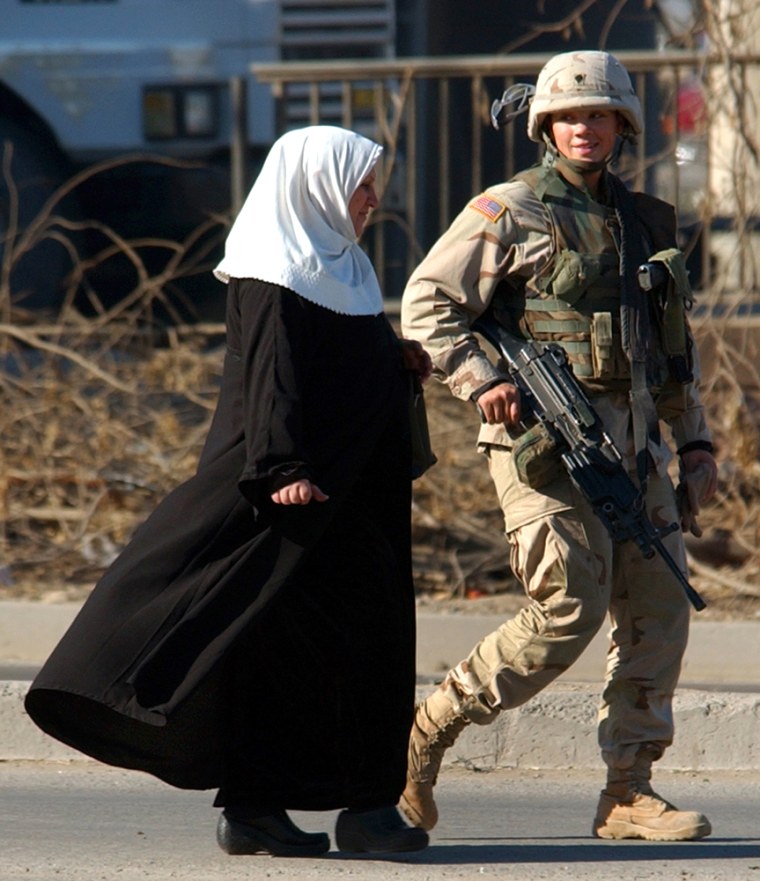House Republicans retreated from a sweeping ban on women in combat support and service units, and instead approved legislation backing the Pentagon’s policy barring women from direct ground combat in a bill passed overnight.
The House Armed Services Committee approved the narrower provision after the Army and Democrats said the amendment, rammed through a subcommittee last week, would close nearly 22,000 jobs to women, undermine morale, and hamper operations in Iraq and Afghanistan.
“We want women to serve everywhere, except in ground combat,” said Rep. John McHugh, R-N.Y. McHugh, chairman of the personnel subcommittee, said the amendment would require Congress to vote before women would be allowed in direct combat units.
The amendment was part of a bill authorizing $442 billion in defense programs for next fiscal year that the committee approved 61-1 in a marathon session that ended after midnight.
Democrats: Ban would demoralize women
The amendment would put into law a policy written 11 years ago by former Defense Secretary Les Aspin that was intended to expand the role of women in the military, but keep them from serving in ground battles.
Democrats said even the narrower amendment sent a demoralizing signal to women, was confusing and unnecessary.
“Women don’t deserve the kind of shabby treatment this committee’s been giving them the last week,” said Rep. Vic Snyder, D-Ark.
Rep. Loretta Sanchez, D-Calif., said Republicans were trying to “fix the terrible language” they put into the bill in the subcommittee.
The measure passed by the full committee was a major step back from the amendment passed last week by the personnel subcommittee that would have imposed a sweeping ban on women in combat support units.
Democrats called that amendment an insult to women serving in Iraq, and the Pentagon quickly raised its opposition.
Iraq combat support now 20 percent women
About 20 percent of the combat support and service units in Iraq are comprised of women, although Army policy keeps women from some support jobs such as repairing tanks or artillery in a fighting situation.
Gen. Richard Cody, the Army Vice Chief of Staff, in a letter to the committee said that amendment would “cause confusion in the ranks and send the wrong signal to the brave young men and women fighting the global war on terrorism.”
But Armed Services Committee Chairman Duncan Hunter, R-Calif., pushed the measure, saying Congress needed to weigh in on whether women should be in "forward support companies," which he said could happen soon unless it intervened.
Those units provide infantry, armor and artillery units with equipment, ammunition, maintenance and other supplies in combat zones. The Army started allowing women to staff such support posts last year and says it is complying with the 1994 policy.
Hunter said there was “massive confusion” in Army policies on women in combat roles, and said it needed to be defined.
No mention in Senate bill
The Senate Armed Services Committee’s version of the defense bill, which it passed last week, does not address the issue.
The House bill, expected to be on the floor next week, also calls for another $49 billion in emergency funds for the wars in Iraq and Afghanistan. The House and Senate Appropriations committees must act to actually provide the money, which would bring costs of the wars to more than $300 billion.
Hunter said the money was needed as a “bridge fund” from the Oct. 1 start of the next fiscal year until March 2006, when Congress would approve another emergency supplemental war bill. Congress last week passed an $82 billion emergency bill largely for Iraq and Afghanistan.
